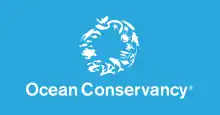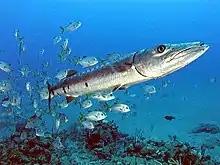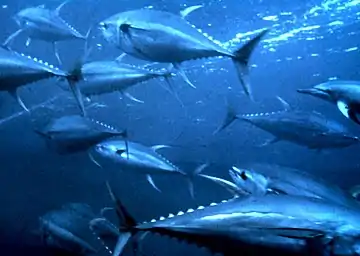Ocean Conservancy
Ocean Conservancy (founded as The Delta Corporation) is a nonprofit environmental advocacy group based in Washington, D.C., United States. The organization helps formulate ocean policy at the federal and state government levels based on peer reviewed science.
 | |
| Motto | "Start a sea change" |
|---|---|
| Predecessor | Bill Kardash, Tom Grooms, Roger McManus, Vice Admiral Roger Rufe (USCG Retired) |
| Formation | 1972 |
| Type | Non-profit environmental organization |
| 23-7245152 | |
| Focus | Arctic, aquaculture, marine conservation activism, Trash-Free Seas, Gulf Restoration an fisheries, marine protected area, Coast and marine spatial planning |
| Location |
|
| Origins | The Center for Environmental Education |
| Website | www |
About
Ocean Conservancy was founded in 1972, as the Delta Corporation to promote healthy and diverse ocean ecosystems, and to oppose practices that threaten oceanic and human life.[1] Through several program areas, Ocean Conservancy advocates for protecting of special marine habitats, restoring sustainable fisheries, reducing the human impact on ocean ecosystems and managing U.S. ocean resources.[2] Ocean Conservancy is a tax-exempt non-profit organization.[2] It meets the Better Business Bureau's 20 Standards for Charity Accountability.[2]
History
Ocean Conservancy was founded in 1972, with goals to promote healthy and diverse ocean ecosystems, and to oppose practices that threaten oceanic and human life. The Conservancy's list of priorities include "Restore Sustainable American Fisheries," "Protect Wildlife From Human Impacts," "Conserve Special Ocean Places," and "Reform Government for Better Ocean Stewardship."[3] It started with goals to promote healthy and safe ocean ecosystems and to help prevent things that threaten oceanic and human life. The conservancy's main concern was to restore sustainable American fisheries and protect wildlife from human impact.
Previous names
Accomplishments
Fisheries
After a four-year advocacy effort, Ocean Conservancy helped enact a Congressional rewrite of the Magnuson–Stevens Fishery Conservation and Management Act in 1996,[7] which changed the way fisheries are managed. It remains the nation's primary fisheries law.[8]
Prior to 1996 the law contained no provisions to stop overfishing or require the rebuilding of fish stocks.[9] There was no prohibition of bycatch, when fish and animals are caught unintentionally by fishing gear or nets targeting specific species. Nor was there a directive to protect fish habitat. Ocean Conservancy lobbied successfully to close these loopholes and establish more sustainable fishing practices.[9]
Marine mammals
Ocean Conservancy aims to protect marine mammals and their habitat. In 1979, the organization established the Seal Rescue Fund (SRF) to protect marine mammals from commercial exploitation. Its efforts to ban whaling resulted in the International Whaling Commission adopting an international moratorium on commercial whaling in 1982. In 1984, Ocean Conservancy led efforts against U.S.-sanctioned fur seal hunt by blocking renewal of the North Pacific Fur Seal Treaty in the Pribilof Islands, as well as efforts to protect dolphins from the tuna industry.[10] Ocean Conservancy was also assisted in the creation of the dolphin-safe tuna-labeling program.[11]
Sea turtles
Ocean Conservancy's effort for sea turtles, which resulted in the requirement for turtle excluder devices (TEDs) in shrimp trawl gear, saves thousands of turtles each year.[12] Ocean Conservancy's Sea Turtle Rescue Fund appealed directly to shrimpers to voluntarily address the problem of sea turtles drowning in their nets.[12]
Ocean Conservancy played a major role in derailing proposals to reopen international trade in sea turtle products and in ending Japanese imports of Hawksbill sea turtle shells.[13]
Coral reef protection and Marine Sanctuaries programs
Ocean Conservancy is attempting to restore coral reefs through coral tree nurseries and research as part of the Recovery Plan with the NOAA.[14] The coral are very sensitive to changes in water temperature and quality caused by global warming, and many times these changes result in disease and death of the reef. The Ocean Conservancy informs the public of the problems plaguing reefs as well as other marine ecosystems through their website and a magazine that they publish. They also have a staff of senior scientists and policy experts who travel to Capitol Hill to share their expertise and to urge policymakers to encourage the implementation of policies regarding the mitigation, adaptation, and alternatives to damaging activities such as the use of carbon-based fuels.[15]
International Coastal Cleanup
.jpg.webp)
One of the Ocean Conservancy's concerns involves setting up ocean cleanups, an event where volunteers can gather to remove trash from their local oceans. Their main event is the International Coastal Cleanup, a day where over 150 countries gather to clean up beaches and oceans.[16] The movement was created by Linda Maraniss and Kathy O'Hara in 1986 when they organized the Ocean Conservancy's first local cleanup event. [17] Since this first cleanup, Ocean Conservancy has helped to pick up over 300 million pounds of trash from the ocean. [16] Scientists have confirmed that about 8 million metric tons of plastic are added to oceans every year, prompting the International Coastal Cleanup to take place and expand every year.[16] In order to easily track the trash being picked up, Ocean Conservancy launched an app called Clean Swell in 2015. The user is allowed to log and photograph the trash they pick up and the information is then sent to the Ocean Conservancy's global trash database.[18]
Criticisms
- The Gloucester Times expressed concern that Ocean Conservancy worked too closely with the National Oceanic and Atmospheric Administration on policies that weaken the fishing industry.[19]
- In 2012, a representative for Louisiana governor Bobby Jindal said that clean-up proposals in response to the 2010 BP oil spill, outlined in a report sponsored by the Ocean Conservancy, as well as Environmental Defense Fund, the National Audubon Society, the Nature Conservancy, Oxfam and the National Wildlife Federation, were "out of touch".[20]
- In 2015, a group of over 200 environmental leaders and organizations sent an open letter and a technical critique of Ocean Conservancy's "Stemming the Tide" report, also released in 2015. The criticism centered on Ocean Conservancy's advocacy for incineration, which the letter writes can cause harmful effects, the damaging cost waste would have on the Asian cities that the report proposed store waste nearby, and the acceptance of the necessity of plastics.[21]
See also
- Sustainability
- Biodiversity
- Global warming
- Ecology
- Earth Science
- Natural environment
- Nature
- Conservation Movement
References
- "Arctic Drilling Could Begin This Summer – Ocean Conservancy". oceanconservancy.org. Retrieved 21 September 2018.
- "Ocean Conservancy". Better Business Bureau.
- "The Ocean Conservancy: What We Do". oceanconservancy.org. Archived from the original on 11 July 2007. Retrieved 21 September 2018.
- "Legal Statement". Ocean Conservancy. 15 February 2017. Retrieved 6 April 2020.
- "Name change certificate of amendment" (PDF). Government of the District of Columbia. Archived from the original (PDF) on 16 January 2011. Retrieved 25 June 2005.
- "Who We Are". Ocean Conservancy.
- [A New Course For America’s Fish and Fishermen: A Review of the Magnuson Stevens Reauthorization Act of 2006 and the Challenges Ahead." Marine Fish Conservation Network (MFCN) Website. MFCN. September 2007. Web. Pg. 3. 2 November 2010 Sustainable Development 16, Dec. 2008]
- [ 16 U.S.C. §§ 1801–1884]
- ["Implementing Annual Catch Limits: A Blueprint for Ending Overfishing in U.S. Fisheries." Marine Fish Conservation Network (MFCN) Website. MFCN, April 2009. Web. Pg. 3. 2 November 2010]
- [ "North Pacific Fur Seal Treaty of 1911". National Oceanic and Atmospheric Administration.]
- "The fairy tale of US "dolphin safe" labelling: False claims, unintended consequences – International Centre for Trade and Sustainable Development". ictsd.org. Retrieved 21 September 2018.
- [ Lee, Scott (1999) (PDF). Ancient Sea Turtles: Stranded in a Modern World. USA: Sea Turtle Restoration Project.]
- [ Anne B. Meylan and Marydel Donnelly, "Status Justification for Listing the Hawksbill Turtle as Critically Endangered on the 1996 IUCN Red List of Threatened Animals," Chelonian Conservation and Biology, April 1999, vol. 3, no. 2, p. 203]
- "Restoring Endangered Coral Reefs". Ocean Conservancy. 28 July 2016. Retrieved 31 March 2020.
- [ "Oceans in peril World's seas face myriad threats" Daytona Beach Daily Journal, 8 June 2009]
- "Trash Free Seas". Ocean Conservancy. Retrieved 6 April 2020.
- "International Coastal Cleanup". Ocean Conservancy. 7 March 2017. Retrieved 6 April 2020.
- "CleanSwell". Ocean Conservancy. 11 April 2017. Retrieved 6 April 2020.
- "Green giants get time with NOAA". Gloucester Times. Retrieved 23 September 2011.
- "Coalition offers vision for gulf restoration". fuelfix.com. Retrieved 20 March 2015.
- "Open Letter and Technical Critique to Ocean Conservancy regarding "Stemming the Tide" report". Global Alliance for Incinerator Alternatives. Retrieved 1 July 2019.
External links
- Official website
- 25 June 2007 United States Government Takes Important Step in Protecting Critically Endangered North Atlantic Right Whales in the Southeast
- 22 June 2007 NOAA Releases Report to Congress on the Status of U.S. Fisheries; Fish Stocks Remain Depleted Due to Overfishing
- 11 June 2007 Endangered Sea Turtles Receive Vital Protection
- 25 March 2007 New Study Shows that Catch Shares Can Help Achieve Sustainable American Fisheries

